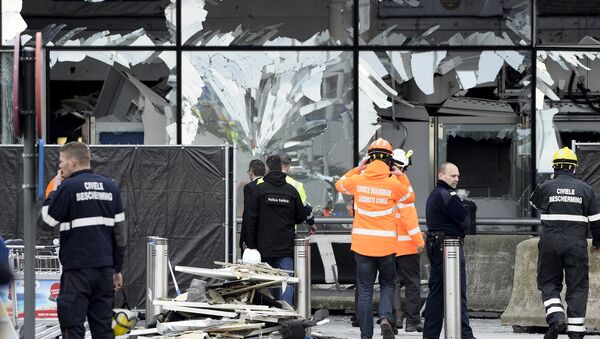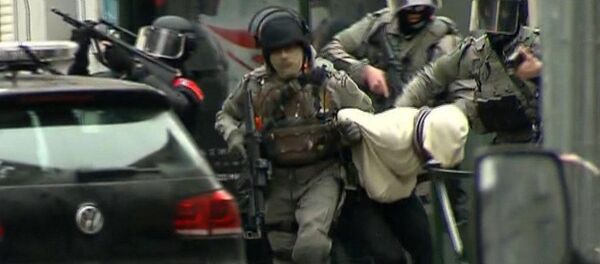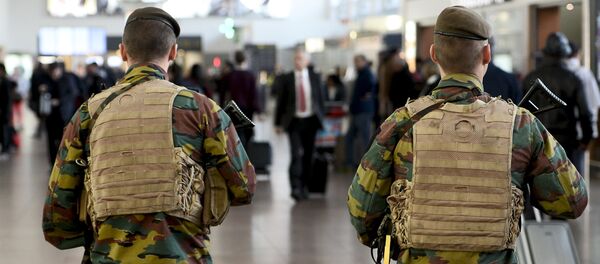1.Airport
Strange as it may seem, Brussels' international airport was not equipped with basic safety equipment. Many experts, as well as Russian and foreign tourists, pointed to a lack of metal detectors at the entrances and the inexplicably free access to the territory of the airport.
"What kind of security can be discussed if the main airport in the country was not equipped with access control monitoring systems?," Josef Linder, president of the International Counter-Terror Training Association was quoted by RT as saying.
He was echoed by Russian tourist Alexandra Sadomtseva, who said that "anyone can enter the airport building and carry any luggage." She added that she saw several servicemen in the airport, but that there were no police officers inside the building.
2. Coordination with neighbors
Unfortunately, Belgian security forces have failed to duly coordinate efforts in the face of a terrorism threat. Right now, the security forces of just five EU countries exchange information on those who are suspected of international terrorism, something that has yet to be done by the security structures of the other 23 EU member states.
"Of course, European intelligence services should better coordinate their efforts as far as the fight against terrorism is concerned. Thus far, cooperation in this area has been inefficient," Jean-Louis Fiamenghi, ex-head of the French police special forces unit RAID said in an interview with RT.
Kirill Kabanov, chairman of the Russian National Anti-Corruption Committee, for his part, berated the Belgian intelligence services for failing to cooperate with their Russian colleagues.
"The main mistake of the Belgian security structures is their lack of cooperation with Russia and its experts, [who have] extensive experience in the fight against terrorism," he said.
3. The Abdeslam factor
After arresting Salah Abdeslam, the Belgian security forces decided that the problem had been resolved, and failed to foresee the possible development of events. This raises eyebrows, given that during an interrogation, the organizer of the terrorist attacks in Paris on November 13 admitted that he was planning a similar attack in Belgium.
In an interview with RT, Alexey Filatov, vice-president of the international anti-terrorist association Alpha, said that the "according to incoming data, the Brussels terrorist attacks were provoked by the arrest of Salah Abdasalam."
"Apparently, a terrorist act was being planned — a large-scale one that should have been staged at a different time. Abdeslam's interrogation could finally help police track his accomplices, which is why terrorist decided to be quick about carrying out the attacks," he said.
4. Molenbeek
As such, the municipality Molenbeek is little more than an uncontrollable ethnic enclave, according to RT. It is safe to assume that law and order in this suburb of Brussels has fallen victim to political correctness and multiculturalism. The security services did not even try to work in this "state within a state" that became an all-European hotbed of terrorism, RT said.
Yevgeny Satanovsky, head of the Moscow-based Middle East Institute told RT that "multiculturalism and migrants' freedom of access from the Middle East and Africa to Europe for several decades made Brussels the capital of European radicalism and Islamism."
"Democracy and human rights have also contributed to this, resulting in the creation of a free Sharia zone in Molenbeek, where the police have not been in decades," he said.
5. Internal fragmentation of security forces
The lack of duly coordination between the city authorities and law enforcement agencies has also played a negative role in the development of the latest tragic events in Belgium.
"The country is, in fact, divided into two enclaves. There is no single government and parliament, as well as there is no interaction between the executive authorities. And separate intelligence agencies cannot interact within their country," Josef Linder said.
He also lamented the fact that "the whole experience of the previous work of the Belgian intelligence services was destroyed by the European Union's policy."
6. Clandestine intelligence agents
Many experts, including Linder, pointed out that the fight against terrorism can only be effective with the help of a full-fledged agent network.
"Intelligence work in the Belgian enclaves was carried out at a minimum level, and combating terrorism in such a way is almost impossible", Linder said.
On March 22, at least 31 people were killed and 300 others injured in a series of explosions at Brussels Airport and in one of the city's subway stations. The terrorist group Daesh (ISIL/ISIS) has claimed responsibility for the attacks.





